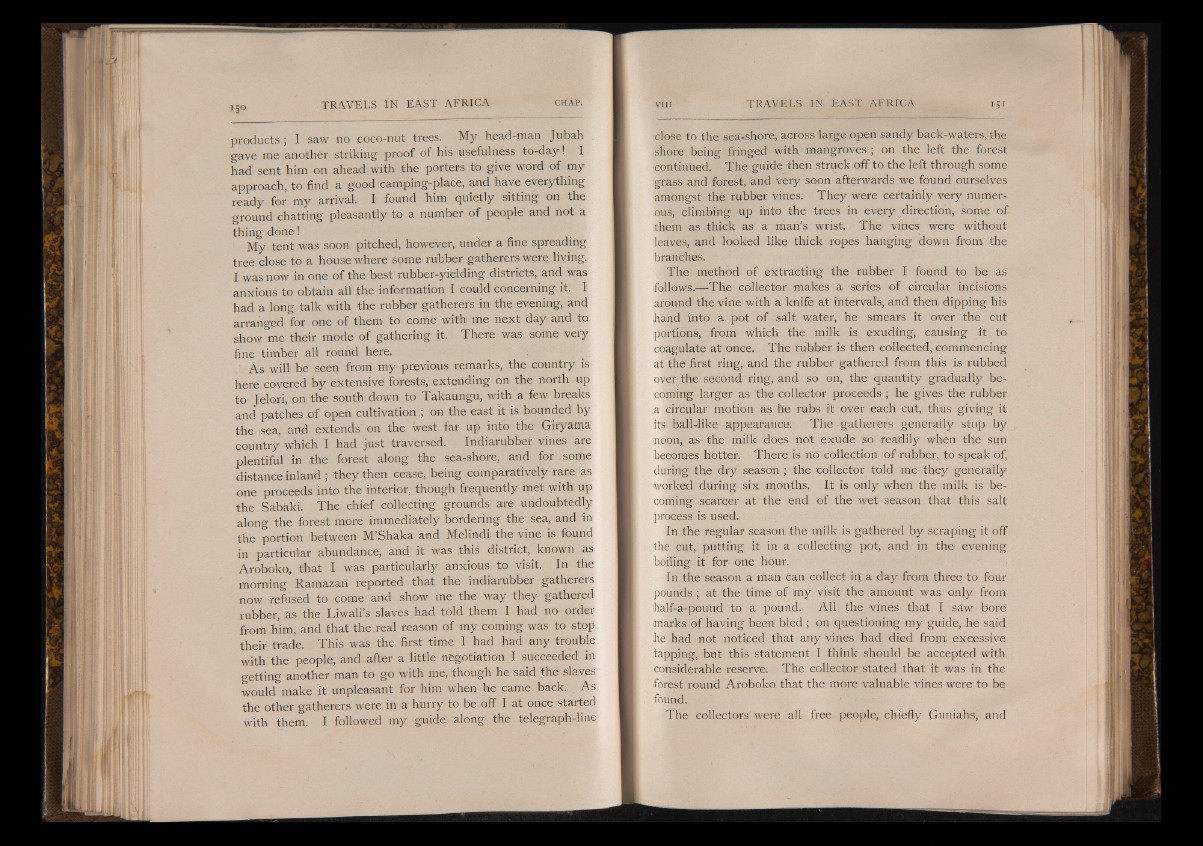
products ; I saw no coco-nut trees. My head-man Jubah
gave me another striking proof of his usefulness to-day! I
had sent him on ahead with the porters to give word of my
approach, to find a good camping-place, and have everything
ready for my arrival. I found him quietly sitting on the
ground chatting pleasantly to a number of people and not a
thing done!
My tent was soon pitched, however, under a fine spreading
tree close to a house where some rubber gatherers were living.
I was now in one of the best rubber-yielding districts, and was
anxious to obtain all the information I could concerning it. I
had a long talk with the rubber gatherers in the evening, and
arranged for one of them to come with me next day and to
show me their mode of gathering it. There was some very
fine timber all round here.
' As will be seen from my previous remarks, the country is
here covered by extensive forests, extending on the north up
to Jelori, on the south down to Takaungu, with a few breaks
and patches of open cultivation ; on the east it is bounded by
the sea, and extends on the west far up into the Giryama
country which I had just traversed. Indiarubber vines are
plentiful in the forest along the sea-shore, and for some
distance inland ; they then cease, being comparatively rare as
one proceeds into the interior, though frequently met with up
the Sabaki. The chief collecting grounds are undoubtedly
along the forest more immediately bordering the sea, and in
the portion between M’Shaka and Melindi the vine is found
in particular abundance, and it was this district, known as
Aroboko, that I was particularly anxious to visit. In the
morning Ramazan reported that the indiarubber gatherers
now refused to come and show me the way they gathered
rubber, as the Liwali’s slaves had told them I had no order
from him, and that the .real reason of my coming was to stop
their trade. This was the first time I had had any trouble
with the people, and after a little negotiation I succeeded in
getting another man to go with me, though he said the slaves
would make it unpleasant for him when he came back. . As
the other gatherers were in a hurry to be off I at once started
with them. I followed my guide along the telegraph-line
close to the sea-shore, across large open sandy back-waters, the
shore being fringed with mangroves ; on the left the forest
continued. The guide then struck off to the left through some
grass and forest, and very soon afterwards we found ourselves
amongst the rubber vines. They were certainly very numerous,
climbing up into the trees in every direction, some of
them as thick as a man’s wrist. The vines were without
leaves, and looked like thick ropes hanging down from the
branches.
The method of extracting the rubber I found to be as
follows.— The collector makes a series of circular incisions
around the vine with a knife at intervals, and then dipping his
hand into a pot of salt water, he smears it over the cut
portions, from which the milk is exuding, causing it to
coagulate at once. The rubber is then collected, commencing
at the first ring, and the rubber gathered from this is rubbed
over the second ring, and so on, the quantity gradually becoming
larger as the collector proceeds ; he gives the rubber
a circular motion as he rubs it over each cut, thus giving it
its|bajl-like appearance. The gatherers generally stop by
noon, as the milk does not exude so readily when the sun
becomes hotter. There is no collection of rubber, to speak of,
during the dry season ; the collector told me they generally
worked during six months. It is only when the milk is becoming
scarcer at the end of the wet season that this salt
process is used.
In the regular season the milk is gathered by scraping it off
the cut, putting it in a collecting pot, and in the evening
boiling it for one hour.
In the season a man can collect in a day from three to four
pounds ; at the time of my visit the amount was only from
half-a-pound to a pound. All the vines that I saw bore
marks of having been bled ; on questioning my guide, he said
he had not noticed that any vines had died from excessive
tapping, but this statement I think should be accepted with
considerable reserve. The collector stated that it was in the
forest round Aroboko that the more valuable vines were to be
found.
The collectors were all free people, chiefly Guniahs, and